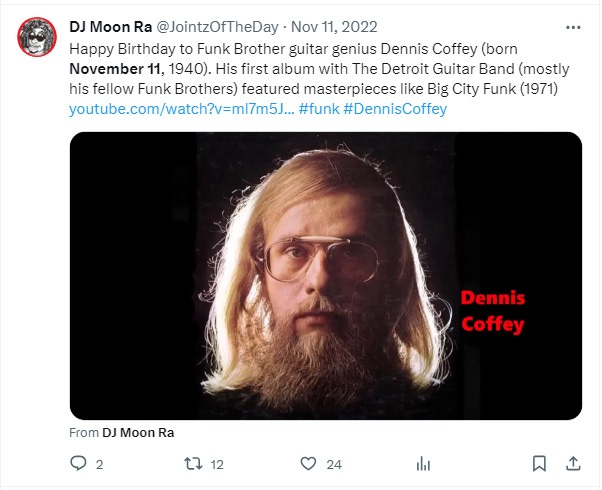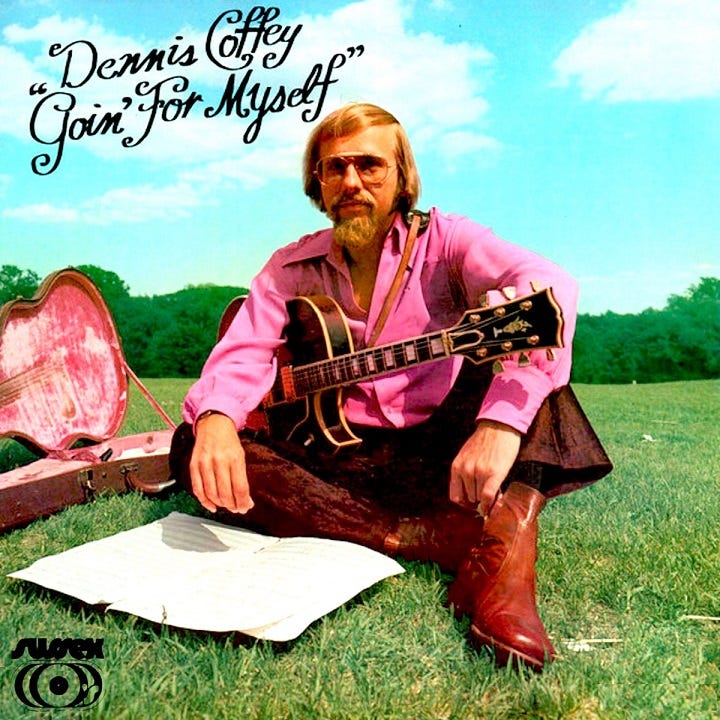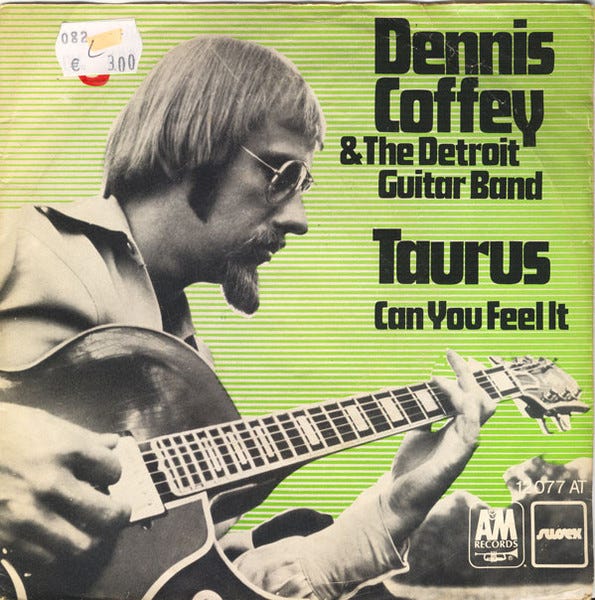Dennis Coffey (born November 11, 1940) – Wings Of Fire (1977)
The Detroit guitar virtuoso and former Motown Funk Brother wrote this phenomenal disco-funk jam for Back Home, his second LP on Westbound Records.
Watch full video on Twitter.
View most updated version of this post on Substack.
Dennis Coffey is a genius Detroit guitarist and one of the last surviving Funk Brothers. He joined Motown’s house band in 1969 and helped usher in the label’s psychedelic soul era.
Born in Detroit, Coffey was exposed to music at an early age and learned to play guitar in middle school. In a 2008 interview, he recalled those days:
“My mom told me I could name every song on the radio when I was three. I had a couple of cousins in the upper peninsula of Michigan, and they played guitar and showed me some chords. I was fascinated with the guitar…somehow, I had a real affinity for music and I started practicing, practiced eight hours a day when I wasn’t going to school in the summer. I ended up contracting and playing on my first session when I was 15. It was great, I heard myself on the radio…took a couple of solos and I was hooked from then on, so I just kept practicing.”
Later in high school, he played teen clubs around Detroit on the weekends. He joined the Air Force, and almost got court-martialed because he was playing gigs at night, but avoided that fate by transferring to another unit. When his service was finished, he returned home to Detroit, and within two weeks had gotten a gig with a local band and began working constantly, playing six nights a week.
He next began doing session work at Golden World, a studio run by Ed Wingate who Coffey thought made his real money from a numbers-running business. Some of the legendary Detroit sessions he played on there included the #2 R&B hit “Open The Door To Your Heart” (1966) by Darrell Banks; “I Wanna Testify” (1967), the first big record from George Clinton’s Parliaments; and late sixties dates with Edwin Starr and Bettye LaVette.
Coffey’s reputation as a session guitarist grew and eventually he was invited to join Motown.
“I got a call one day from James Jamerson, the bass player, he introduced me to Hank Cosby, who was Stevie Wonder’s producer. They said they were doing this producers’ workshop upstairs at Golden World, because by then Motown had purchased it, and they wanted me to be part of the rhythm section. Within a few weeks Norman Whitfield, the producer, came in with this song “Cloud Nine”, and by that time I was playing funk in the clubs…so, I pulled out the wah-wah pedal and played it on “Cloud Nine” and within two weeks I was in the studio recording it. All that effects stuff on all The Temptations records, that’s me doing all that.”
Starting in 1969, Coffey became one of the Funk Brothers, Motown’s uncredited house band of top-notch musicians who were largely responsible for shaping the label’s signature sound, alongside Jamerson, rhythm guitarist Robert White, keyboardist Earl Van Dyke, and percussionists Jack Ashford and Eddie “Bongo” Brown. He estimates he was doing eighteen sessions per week for years and played on an astounding number of songs, upwards of fifty every week.
Coffey released his first solo album Hair And Thangs that same year in 1969 on Maverick Records, credited to the Denis Coffey Trio. Original copies today sell for hundreds of dollars on Discogs. Produced by Mike Theodore, who would become Coffey’s frequent songwriting partner and producer, it was mostly a collection of hard rock instrumental covers from the hit musical Hair, plus tracks by the Beatles, the Isley Brothers, and the Watts 103rd Street Rhythm Band. It also contained two originals written by Coffey and the trio’s other members (keyboardist Lyman Woodard and drummer/horn player Melvin Davis), the explosive “Hair & Grits” and the ultra-funky jam “Iceberg Thang.”
Although Hair And Thangs did not chart, his second album Evolution was a surprise best-seller. By the time Coffey released it in 1971 on Clarence Avent’s Sussex Records, he was an established Funk Brother and several of his Motown bandmates moonlighted on the LP, including Van Dyke, Ashford, Brown, bassist Bob Babbitt, and drummers Uriel Jones and Pistol Allen.
Propelled by its hit single “Scorpio,” which went to #6 R&B and #9 on the Billboard Hot 100, the album peaked at #13 R&B and #36 on the Billboard 200. It would be Coffey’s biggest-ever hit record, later sampled by Public Enemy and LL Cool J, among others. “Scorpio” was memorably featured on Soul Train’s groundbreaking first nationally syndicated season, in episode #17 that aired on January 22, 1972.
“Scorpio” was written by Coffey (an anthem for his own astrological sun sign), produced by Theodore, and arranged by them both. The track was already a super funky instrumental, but it featured an extra-funky extended break with Babbitt and “Bongo” Brown soloing.
The album’s other highlights included the laid back psychedelic jam “Garden Of The Moon,” the epic funk odyssey “Impressions Of,” and the superb jam “Big City Funk,” which he co-wrote with Theodore.
For his third album Goin’ For Myself (1972), Coffey attempted to follow up “Scorpio” with another astrological shout-out, this time to “Taurus.” According to his chart he has a stellium (cluster of planets) in that sign. The track was another funky hit, landing at #11 R&B and #18 on the Hot 100. It was one of the earliest nationally charting records to feature whistles in its breaks, which became a dancefloor staple later in the decade.
He and Theodore co-wrote the stellar funk anthem “Can You Feel It,” which was released as the B-side to “Taurus.” Motown was in the process of officially shutting down its Detroit operations in 1972 and moving to Los Angeles, and partially as a result of the turmoil this caused for its studio musicians the only Funk Brothers who made return appearances on Goin’ For Myself were Babbitt and Ashford.
Over the next few years, Coffey released several more funky, mostly instrumental albums. Sussex Records folded in 1975 due to unpaid taxes, a consequence of the bankruptcy of Avant’s company Avant Garde Broadcasting in which the entrepreneur lost more than $600,000. Coffey then switched labels to Detroit’s Westbound Records, where he released Finger Lickin' Good (1975), an album that put him back on the charts went it hit #31 R&B.
For his next Westbound LP Back Home (1977), he wrote one masterpiece after another, including its stellar title track, the laid back love symphony “High On Love,” the upbeat dancefloor anthem “Boogie Magic,” and the phenomenal disco-funk jam “Wings Of Fire.”
Coffey’s last album of the seventies and final release on Westbound Records was the rare 1978 LP A Sweet Taste Of Sin, which featured several guest vocalists. It was again a quality production from start to finish, from its sexy funk title track (co-written with Theodore) to the disco-funk anthem “Gimmie That Funk,” which Coffey co-wrote with unsung Detroit singer/songwriter Cleveland Horne, and the funky masterpiece “You Know Who You Are.”
Happy Birthday to the great Dennis Coffey.
Further info:
“Dennis Coffey on The Funk Brothers, Scorpio and Self-Reliance,” transcript and video of interview by Jeff “Chairman” Mao, Red Bull Music Academy, 2008.
“Dennis Coffey: 'Berry Gordy built Motown as a corporation',” The Guardian, April 23, 2019.
“Dennis Coffey: From rockabilly to jazz,” interview, One Detroit, Detroit Public Television, May, 2020.
#soul #funk #Motown #FunkBrothers #DennisCoffey










Excellent!